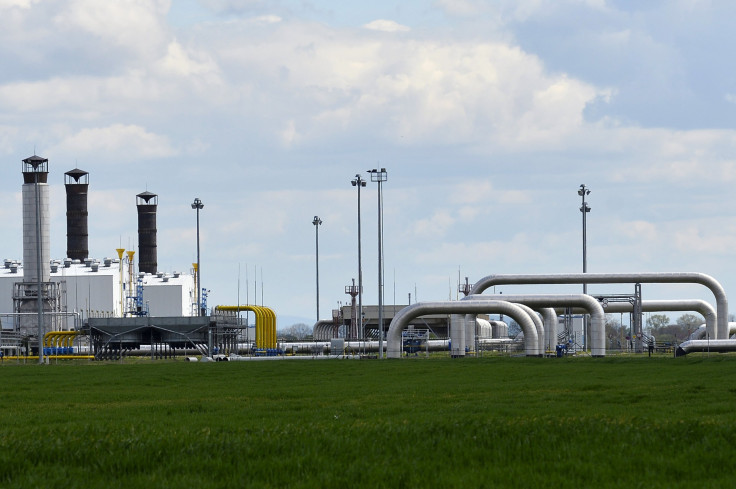Rising Ukraine-Russia Tensions Bring More Focused Discussion Of West's Energy Options

That the march toward war between Russia and Ukraine highlights Western diplomacy’s failure to tame Russian President Vladimir Putin’s irredentist ambitions is clear, but in recent days Europe’s intellectuals and politicians have moved discussion about possible solutions to the problem of Russia’s stranglehold over European energy more into the open.
Russian natural gas giant OAO Gazprom has pressured Ukraine twice in the past, cutting off gas over payment disputes, and its recently hiked the cost it charges the country for the key fuel.
Polish Prime Minister Donald Tusk, in a Tuesday op-ed for the Financial Times, argues Europe must stand together on the Russian energy issue and form a collective to negotiate trade pacts and escape Russia’s “stranglehold.” Europe, he wrote, must “confront Russia’s monopolistic position with a single European body charged with buying its gas.”
Such an energy union could be modeled on the banking union the EU is already creating to support Europe’s financial institutions and the EU’s atomic energy agency, used to jointly buy uranium for nuclear power plants throughout the EU, Tusk wrote.
The crisis that gave rise to Tusk's idea threatens all of Europe.
“Naftogaz (Ukraine's state-owned gas company) has struggled to pay for its Russian gas imports since late 2013, and now owes Gazprom more than US$2 billion,” Jack Sharples, an academic and lecturer in Energy Politics at the European University of St. Petersburg, wrote in a blog published by the London School of Economics. “The combination of Naftogaz’s debts and unwillingness to pay the higher price means that many in Europe fear a suspension of Russian gas supplies to Ukraine – which, as it travels through the same pipelines, would also interrupt Russia’s gas exports destined for Western Europe.”
U.S. Vice President Joe Biden voiced support Tuesday for Ukraine’s efforts to gain energy independence on a two-day visit to Kiev, and the U.S. government unveiled a $50 million aid package to Ukraine.
“Imagine where you’d be today if you said to the Russians: ‘Keep your gas’,” Biden said in Kiev.
Russian Prime Minister Dmitry Medvedev responded Tuesday from Moscow by saying that Russia will now make Ukraine prepay for its gas, unless the smaller country begins paying down its debt to Gazprom accumulated through March.
Energy research firm IHS has predicted that gas would only be cut off to Europe if Russia chose to shut its exports off, a move IHS does not believe will happen.
The EU receives more than 25 percent of its gas from Russia but those exports account for 60 percent of Russia’s total gas exports.
“Can they stop purchasing Russian gas? In my view, it’s impossible," Putin told the Russian media last week. “Can we stop deliveries? In my opinion, this is completely unrealistic. Only by harming yourself, through blood is this possible, but I can’t even imagine this.”
But as recently as April 10, Putin announced that Russia would cut its gas supply to Ukraine if it did not pay its bills, which would reduce deliveries to Europe.
It’s a symbiotic relationship fraught with danger that in normal times would have both sides working together. But now with Russian and Ukrainian guns pointed at each other, the EU is to no small extent standing in the line of fire.
“For Europe, the disintegrating Gazprom-Naftogaz relationship is the greater worry,” Sharples wrote. “Both sides have in the past failed to use arbitration and dispute resolution to resolve their disagreements, and the ongoing arguments and two complete gas suspensions were the result. Given the recent statements by Russian and Ukrainian officials, another suspension of Russian gas supplies to Ukraine cannot be ruled out.”
Prospects for just such an embargo, in some ways similar to the Arab crude oil embargo of the 1970s, argues for a continental union.
“Whether in coal, steel, uranium, credit or gas, the principal idea of the EU has always been to bring Europe together, deepening our security and establishing fair rules where the free market is lacking,” Tusk wrote. “An energy union, too, would be based on solidarity and common economic interests.”
After negotiating prices as a single entity, Europe should attempt the longer-term task of breaking up Gazprom’s monopoly and restoring free market competition, he argued.
Tusk laid out six steps of the would-be energy union: Develop the entity to negotiate gas contracts with Russia; guarantee solidarity among member states to assure needed gas storage facilities and transport will remain available; support building new energy infrastructure; make full use of available fossil fuels; reach out to partners outside Europe; and strengthen the Energy Community created by the EU in 2005 to expand European gas eastward.
Tusk will meet with EU President Herman Van Rompuy in Brussels on Wednesday. On Thursday he plans to meet with French President Francois Hollande in Paris and on Friday talk with German Chancellor Angela Merkel in Berlin.
Despite the conflict, Sharples argues that Europe and Russia will likely strike a deal rather than take extreme measures.
“Occasionally the European media refer to Russia’s gas as an ‘energy weapon,’ or to the possibility that Russia may ‘turn off the taps’ as leverage in a political dispute with the EU,” he wrote. “But this is simply not credible: both Russia and EU member states and their energy companies have a vested interest in maintaining good trading relations.”
© Copyright IBTimes 2024. All rights reserved.






















